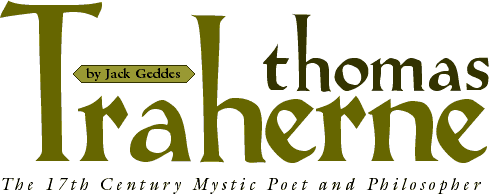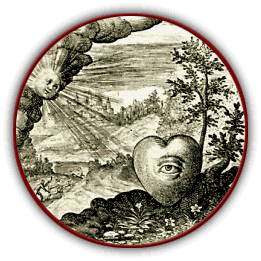

The words were ‘beautiful’. There was no other way of describing them or the sentiments that lay behind them. I was immediately captivated, as I came upon this quotation long years ago, from the writings of Thomas Traherne when reading The Perennial Philosophy of Aldous Huxley:-
‘Your enjoyment of the World is never right till every morning you awake in Heaven; see yourself in your Father’s Palace, and look upon the earth and air as celestial joys, having such reverend esteem of all, as if you were among the Angels. The bride of a monarch, in her husband’s chamber, hath no such causes of delight as you.
You never enjoy the world aright till the sea itself floweth in your veins, till you are clothed with the heavens and crowned with the stars; and perceive yourself to be the sole heir of the whole world, and more than so, because men are in it who are every one sole heirs as well as you. Till you can sing and rejoice and delight in God, as misers do in gold, and kings in sceptres, you can never enjoy the world...’
Those of you who have read anthologies may have seen this passage and others quoted. For instance, in the Pelican Book of English Prose, this particular passage has not been quoted but other exquisite passages under the heading ‘Vision of Childhood’ in which Traherne recaptures as none else ever has, the wondering and glorious vision of a child, and I quote again:-
‘The Corn was Orient and Immortal Wheat which never should be reaped, nor was ever sown. I thought it had stood from Everlasting to Everlasting. The Dust and the Stones of the Street were as precious as Gold. The Gates were at first the end of the World, the Green Trees when I saw them first through the Gates Transported and Ravished me; their Sweetness and unusual Beauty made my heart to leap, and almost mad with Ecstasy, they were such strange and Wonderful Things; The Men! O what Venerable and Reverend Creatures did the Aged seem! Immortal Cherubims! And the young Men Glittering and Sparkling Angels and Maids strange Seraphic Pieces of Life and Beauty! Boys and Girles Tumbling in the Street and Playing, were moving Jewels. I knew not that they were born or should die...’
Yet do not be surprised if you have never heard speak of Thomas Traherne from any pulpit, as ‘the Centuries of Meditation’ – the name since given, were discovered in Manuscript form on a barrow in Farringdon Road, London in 1895, and not until 1905 were they published. Thus the Church has only had 80 years to discover him! – and anyway, the words of true mystics are seldom orthodox.
Orthodoxy seems to have decreed that God is God and Man is Man and never the twain shall meet. We are God’s children created in his image, often taken to mean ‘physical image’ (although why God should need a pair of feet, for instance, is hard to understand). God is ‘other’ and always separate to us, but both eastern and western ‘mystics’ alike tend to assert that God can be experienced by man or that by the raising of our consciousness we can enter into the very mind of God. Thus the true mystics are according to orthodox views, somewhat heretical.
Nearly all of us have at some moment in our lives for some good reason enjoyed moments of ecstasy. Do we not all know the meaning of the word? Yet whilst we identify any moment of ecstasy with that which seemed at the time to have caused it, ‘ecstasy’ might all the time exist could we but tap into it. As Thomas Traherne well knew, it is really our attitude towards the world that conditions us as to whether we find it personally to be a heaven or hell. – ‘for the World is both a Paradise and a Prison to different persons’ (Centuries.1.35).

This is how the authoress Gladys Wade opens her commentaries on Thomas Traherne:-
‘In the middle of the seventeenth century, there walked the muddy lanes of Herefordshire and the cobbled streets of London, a man who had found the secret of happiness. He lived through a period of bitterest, most brutal warfare and a period of corrupt and disillusioned peace. He saw the war and the peace at close quarters. He suffered as only the sensitive can. He did not win his felicity easily. Like the merchantman seeking goodly pearls or the seeker for treasure hidden in a field, he paid the full price.
But he achieved his pearl, his treasure. He became one of the most radiantly, most infectiously happy mortals this earth has known.’
Gladys Wade is of course referring to those tumultuous times in which Traherne lived; the Civil War which particularly raged through Herefordshire; the harsh puritanical interlude of Oliver Cromwell’s ascendancy; the more frivolous times of Charles II.
Thomas Traherne did not believe that God had created Man in his ‘physical image’ but that we should look interiorly for the image of God in our Souls. He believed that as little children we once knew that innocence and wonder which he equates with the Paradise as Adam knew it before the fall. We then become corrupted by the dirty devices of this world but should again seek to achieve the wonder of the childhood innocence. He undoubtedly did so. He believed that each day each of us was heir to the whole beautiful world.
Since that great ‘discovery’ on the barrow in Farringdon Road, you may discover more through the works I have listed below.
The son of a humble shoemaker of Hereford, Thomas Traherne survived the tumultuous times of the Civil War which raged through England and especially Herefordshire, leading to the beheading of Charles I, the rule of Cromwell and the restoration of Charles II. These times also led to corresponding upheaval and schism in the Christian Church.
Fortunately for Thomas Traherne, a good benefactor (thought to be his Uncle, a publican of Hereford) sent him up to Oxford and to Brasenose College when he was only 15 years old, together with his elder brother Philip, both of whom studied theology and were ordained. In the case of Thomas Traherne, he was appointed thereafter as Minister to the village of Credenhill in Herefordshire.
Not without some difficulty and some fallings by the wayside during adolescence as he hints in “the Third Century”, he achieved his ‘felicity’, for his ‘Centuries of Meditation’ flow as calmly and serenely as a river (the beautiful river Wye, on whose banks he was born, it has been suggested elsewhere).
Whilst in Herefordshire he had become acquainted with a highborn lady, Susanna Hopton, the wife of a former Parliamentary Officer, a person of great piety and vitality. Some form of very exalted love developed between them which was above all passion. But I have yet to tell you an extraordinary thing.
These writings were for her and her alone, and not for we who now take delight in them.
She evidently gave him the notebook in which to write. He dedicated it to her with the opening words:-
‘This book unto the friend of my best friend (God?)
As of the wisest love a mark I send
That she may write my makers praise therein
And make herself thereby a cherubim.’
Despite the passage of the tumultuous civil war, which scarcely merits mention, he instructed her that each of us was the heir, each morning, to a pristine radiant world of infinite wonder and beauty, a truly glorious kingdom and for which we should give thanks each day continually to our Creator and for our God-given limbs. Listen to his magic imagery:-
‘The world is a mirror of Infinite Beauty, yet no man sees it. It is a Temple of Majesty, yet no man regards it. It is a region of Light and Peace did not man disquiet it. It is the Paradise of God. It is more to man since he is fallen, than it was before. It is the place of Angels and the Gate of Heaven.’
“You never enjoy the world aright, till you see how a sand exhibitith the wisdom and power of God and prize in everything” (C1. 27).
So the ground on which Traherne walked became almost Holy ground, and he embraced the world in his love and constantly thought that we should do so and give thanks for it and it was not to be rejected, and they were even to be despised who rejected it, an almost heretical view! For others and indeed many of the Fathers of the Church and a number of its mystics (certainly not St. Francis of Assisi) thought the World should be despised and rejected with the flesh and the devil, in that order – and some persons may still think so!
Yet despite all I have said, I would leave a very wrong and unbalanced picture of Thomas Traherne, if I did not also emphasise that of the “Centuries of Meditation” (there are 410 meditations or spiritual instructions altogether) many also point us to the Kingdom of Heaven within and enjoin us (or indeed Susanna Hopton, for whom we now know they were intended) to look for the image of Christ whithin us and to meditate upon him, so I will conclude with part of one of the meditations, which might seem to deal with “Christ consciousness” ( and also to mirror the “Atman” of Indian spirituality):- (Century 100 of the First Century).
“… And thus all ages are present in my soul and all kingdoms and God blessed forever. And thus Jesus Christ is seen in me, and dwelleth in me, when I believe upon Him. And thus all Saints are in me, and I in them. And thus all Angels and the Eternity and Infinity of God are in me for evermore. I being the living temple and comprehensor of them. Since therefore all other ways of In-being would be utterly vain, were it not for this; And the Kingdom of God (as our Saviour Saith) is within you, let us ever think and meditate on Him, that His conception, nativity, life and death may always be within us. Let heaven and earth, men and angels, God and His creatures be always within us, that is in our sight, in our sense, in our life and esteem: that in the light of the Holy Ghost we may see that glory of His Eternal Kingdom, and sing the song of Moses, and the song of the Lamb saying, Great and marvellous are Thy works, Lord God Almighty, just and true are Thy Ways, Thou King of Saints”.
Late in his life, Thomas Traherne became the private Chaplain of Sir Orlando Bridgeman, who was keeper of the Great Seal to King Charles II. When Sir Orlando fell into royal disfavour, Thomas Traherne followed him into “exile” at his home at St Albans, London, where he did not long survive him.
– Jack Geddes
Further Reading:
©Copyright Knowledge of Reality Magazine 1996-2006. All rights reserved.
Any comments, queries please email us.